Trump Starts Global Trade War: The World Reacts
138- 3.04.2025, 14:56
- 61,788
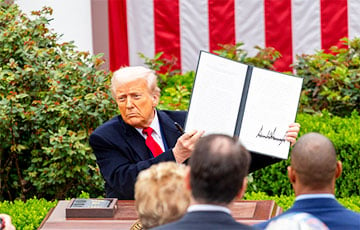
The first consequences in the world and the US economy.
Tariffs announced by US President Donald Trump for US trading partners around the world range from 10% to 49% on imported goods. The highest US tariffs in a century have caused anxiety and confusion among world leaders. According to the material of RBC-Ukraine, what kind of duties will countries face, how they react in the world and whether the "trade war" will intensify. During a speech in Washington outside the White House, Trump announced he would apply at least a 10% tariff on all U.S. exporters, and even more tariffs on roughly 60 countries, to counter large trade imbalances with the United States. Such a list includes some of the largest trading partners of the United States, such as the European Union, Japan, Vietnam, as well as China. The latter is now facing a duty that exceeds 50%.
In addition, Trump declared a state of emergency in the US due to the size of the trade deficit, which allows him to use special powers to set tariffs. The US president also announced the introduction of a 25% duty for all foreign automakers. It should be noted that a separate import tariff of 10% is introduced for Ukraine. The new reciprocal tariffs will come into effect on April 9. Meanwhile, the minimum basic tariff will be paid by all countries from April 5. In total, 183 countries and the European Union are indicated in the list published by the White House to which the new duties will apply. Below are some of them, and we will add a general list in the photo table.
Cambodia — 49% Vietnam — 46% Sri Lanka — 44% Thailand — 36% China — 34% Bangladesh — 34% Taiwan — 32% Indonesia — 32% Switzerland — 31% South Africa — 30% Pakistan — 29% South Korea — 25% Japan — 24% Malaysia — 24% EU — 20% Israel — 17% Philippines — 17% UK — 10% Brazil — 10% Singapore — 10% Chile — 10% Ukraine — 10%.
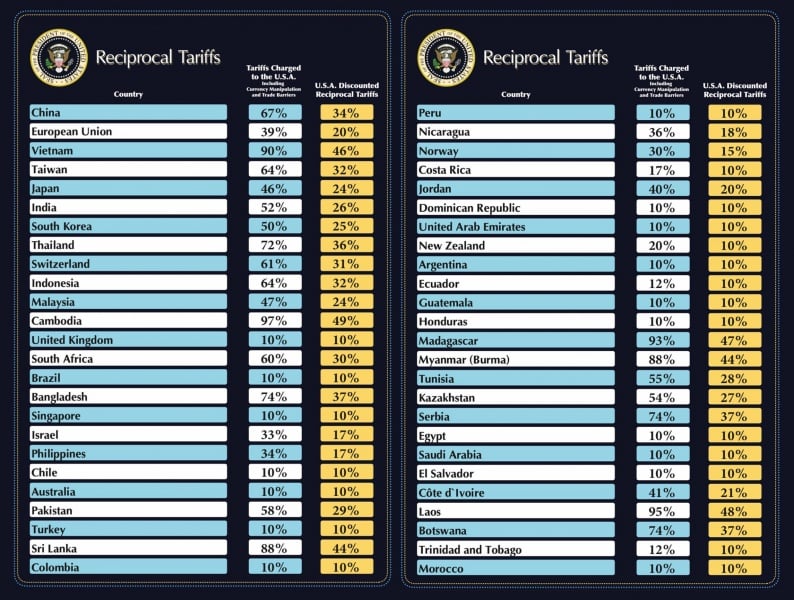
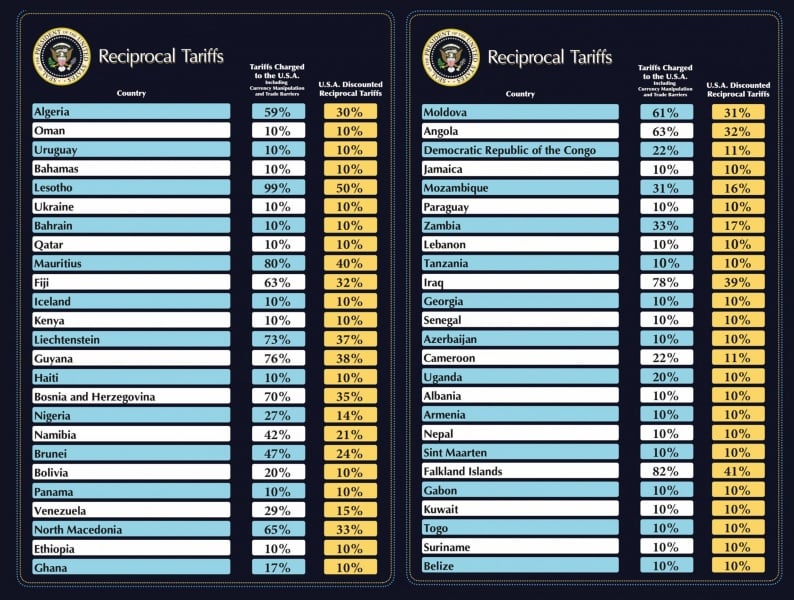
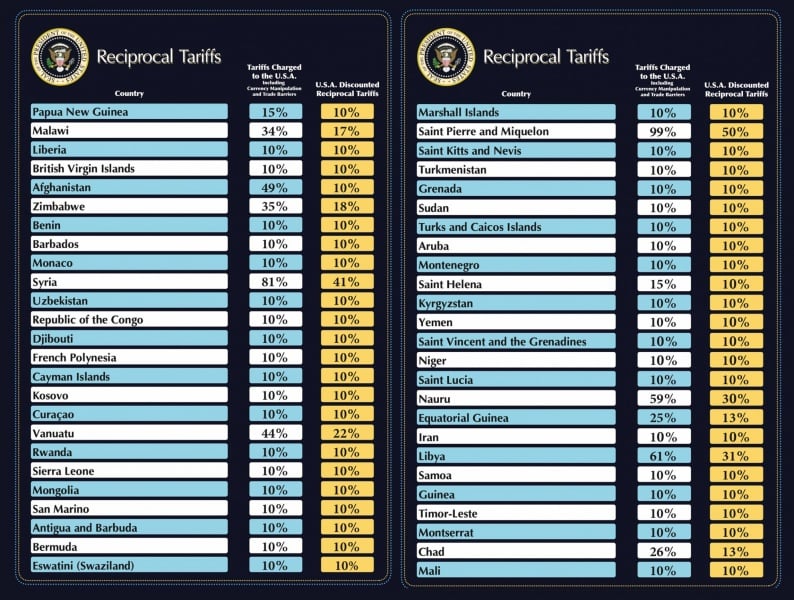
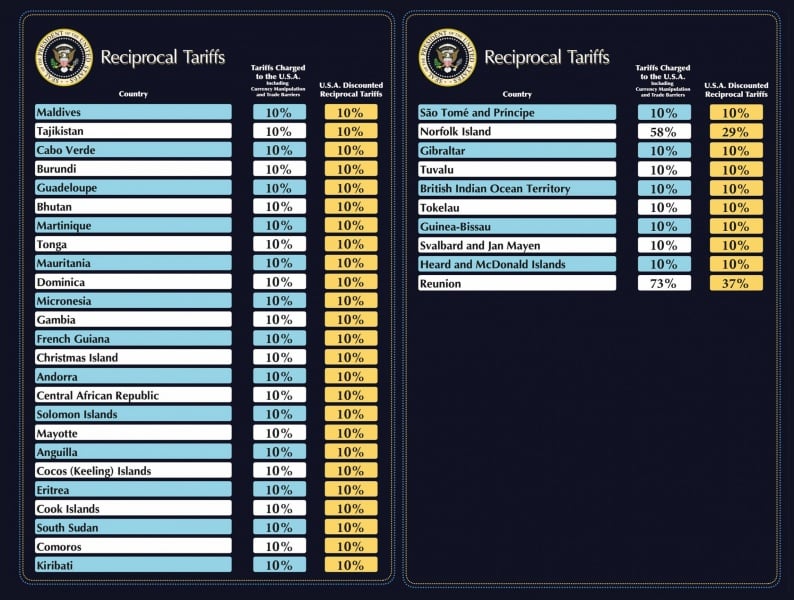
Exceptions
It is worth noting that so far the new tariff measures do not apply to Canada and Mexico, which are involved in a separate dispute over tariffs with the United States. In addition, the US will not apply new duties on certain products: among them cars, individual steel/aluminum products and auto/auto parts, semiconductors, lumber, ingots, copper, pharmaceuticals, energy and other certain minerals that are not available in the US. It should be added that mutual duties on the part of the United States do not apply to Belarus, Cuba, Russia and the DPRK.
Tariffs for Asian countries
US Treasury Secretary Scott Bessent has already confirmed that there will be a 54% tariff for China (34% announced to be added to the already existing 20% that Trump has already imposed this year in connection with the fentanyl trade). This means that many Chinese imports face tariffs in excess of 50%. According to Bloomberg Economics estimates, they are high enough to wipe out most U.S.-China trade by the end of this decade. Trump also announced that he would stop duty-free delivery of small parcels from China under the so-called de minimis exemption. As for close American partners in Asia, mutual rates are introduced for Japan and South Korea at an average of 20%, that is, almost twice as much as for Vietnam.
US urges countries not to take countermeasures
Western observers called such a step on the part of the American leader "a dramatic escalation of Trump's trade war." According to Bloomberg, this is likely to entail an immediate response from other countries. At the same time, US Treasury Secretary Scott Bessent, after Trump's speech, urged other countries not to use countermeasures, advised "not to take revenge", and hinted that duties could be increased. It is worth noting here that the US president admitted the possibility of lowering tariff rates if trade partners take measures that will promote American exports. Trump urged foreign leaders to “remove their own tariffs, remove barriers” and “not manipulate their currencies.”
Reaction in the world and in the economy
The European Union, which is preparing emergency measures in response to protect its economy, is subject to a 20% duty. Western media wrote that the head of the European Commission, Ursula von der Leyen, should make a statement on new US tariffs in the morning (Minsk time). UK Business Secretary Jonathan Reynolds told The Associated Press that “the US is our closest ally, so our approach is to remain calm and committed.” The official added that London is working to conclude a trade agreement in order to “soften the impact” of new US duties. Australian Prime Minister Anthony Albanese assured that the country does not plan to “participate in the race… which leads to higher prices and slower growth.” The president of the Swiss Federation, Karin Keller-Sutter, wrote on her social network account that the country “will quickly determine the next steps”. Norway's Minister of Trade and Industry, Cecily Mirset, told state broadcaster NRK that the country would make the calculations and “get a general idea of what it really means for Norway”. Swedish Prime Minister Ulf Kristersson said the country “will continue to advocate for free trade and international cooperation”. Irish Deputy Prime Minister and Minister of Trade Simon Harris noted that such a decision by the United States on a 20% duty for the EU "is regrettable". New Zealand's commerce minister, Todd McClay, said the country was not going to retaliate against the states with counter-taxes because it would “raise prices for New Zealand's consumers and that would lead to inflation”. The Ministry of Commerce of China has already promised to take countermeasures, but did not specify what steps Beijing can take. He called on the States to “immediately lift their unilateral tariff measures and properly resolve their differences with their trading partners through dialogue on an equal footing”. Vietnamese Prime Minister Pham Minh Chinh held an urgent cabinet meeting hours after the Trump administration announced a 46% tariff for the country. The Tien Phong newspaper, citing an official representative of the ministry, writes that the heads of the Ministry of Commerce will present a report on the impact of duties on Vietnam's exports and the prospects for its economic growth. During the first trades after Trump's announcement, U.S. stock futures fell more than 3% and oil fell. Chinese stocks fell, as did the renminbi, with the main mainland Hong Kong-listed stock exchange starting 2.6% lower before offsetting some of the losses.











